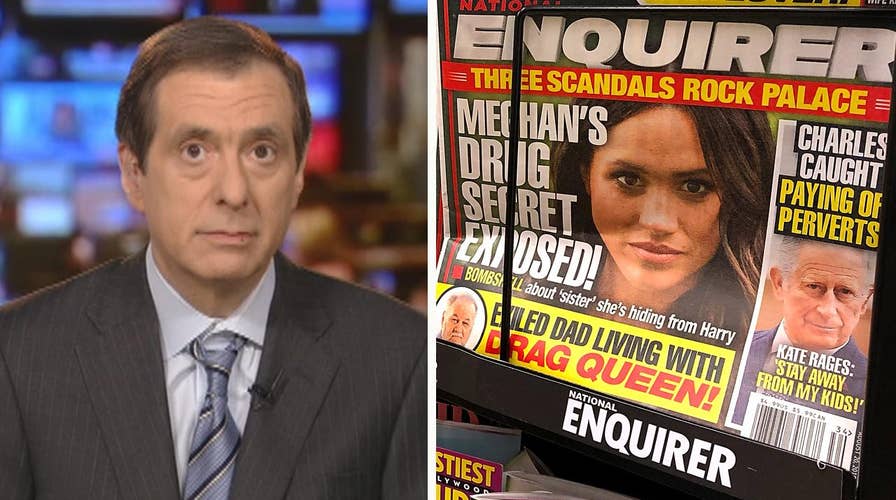Kurtz: How does even a supermarket tabloid regain trust?
'MediaBuzz' host Howard Kurtz weighs in on the survival of AMI, the parent company of The National Enquirer, after David Pecker made a deal with federal prosecutors to provide information on alleged business dealings with Donald Trump.
At first, executives at the National Enquirer's parent company didn't regard the mess surrounding its payment to a woman alleging an affair with President Trump as that big a deal.
Publicly, the company insisted that ex-Playboy model Karen McDougal was paid $150,000 — which included the rights to her life story —to appear on a couple of magazine covers and write a fitness column. It was not, they insisted, to buy and bury a story that could hurt Trump, a close pal of David Pecker, who runs the parent company American Media Inc.
But as the heat got turned up, I'm told, company executives went from contradicting themselves to remaining silent for a long period. As federal prosecutors in New York ramped up their investigation, these executives came to grips with the reality that they could be facing criminal penalties.
So they flipped. And they were rewarded on Wednesday with a deal that shielded Pecker, chief content officer Dylan Howard and AMI itself from prosecution.
But it did more than that, as some insiders see it. The deal essentially ensured that the Enquirer and its sister publications would survive, since an indictment of the company might have been a fatal blow.
In return, Pecker and his company agreed to cooperate with the U.S. attorney's investigation. And that cooperation, under the deal, is supposed to continue. But insiders believe the firm has little additional information to provide and say there is no mythical "safe" with dirty details on additional women.
The agreement was made public on the same day that Michael Cohen, who dealt with AMI on the McDougal mess, was sentenced to three years in prison, mainly for bank and tax fraud.
Prosecutors said in a statement that AMI has admitted buying McDougal's story to make sure she "did not publicize damaging allegations about the candidate." What's more, contrary to its past denials, the company acknowledged it was trying to kill the story "to prevent it from influencing the election."
Cohen, according to prosecutors, planned to reimburse Pecker's company by cooking up a phony $125,000 fee to an outfit affiliated with AMI for "advisory" services. Pecker approved that arrangement, but later told Cohen to call it off and destroy the paperwork, the prosecutors said.
In an interview with Harris Faulkner yesterday, Trump said he didn't think his side made any payment to AMI. (That's true; see above.) The president went on to say that the payments to McDougal and Stormy Daniels are not campaign finance violations — or if they are a fine would be the usual punishment – and were put into Cohen's plea solely to "embarrass" him.
Under the previously secret deal — and this is new — AMI said it would train its staffers on election law and name a lawyer to review stories that involve paying for stories that might involve political candidates.
There has been a whole lot of analysis from the media and from Democrats that AMI's cooperation and Cohen's plea means the president, at least theoretically, could be charged with a crime. That very much remains to be seen, and politically, many people just see it as dissembling over sex.
But what about AMI's reputation? That's not a snide question, because the Enquirer has broken plenty of legitimate news over the years. That includes the case of John Edwards and his campaign mistress, which led to an unsuccessful prosecution against the former presidential candidate.
But the Enquirer has now been shown not only to be in the tank for Trump but to have actively tried to help get him elected by buying off women making accusations against him.
Doesn't even a supermarket tabloid have to do something to regain the trust of its readers?
























